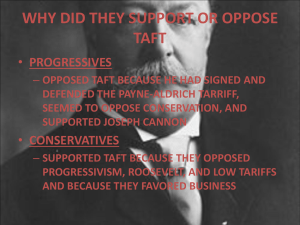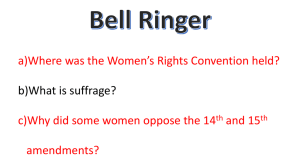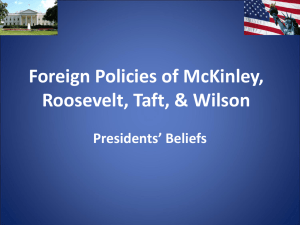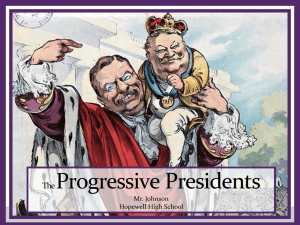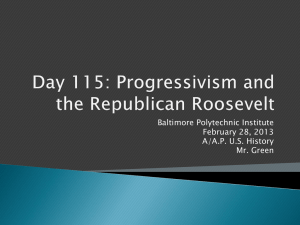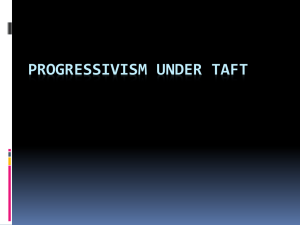File - Mr. Harrison`s Website
advertisement
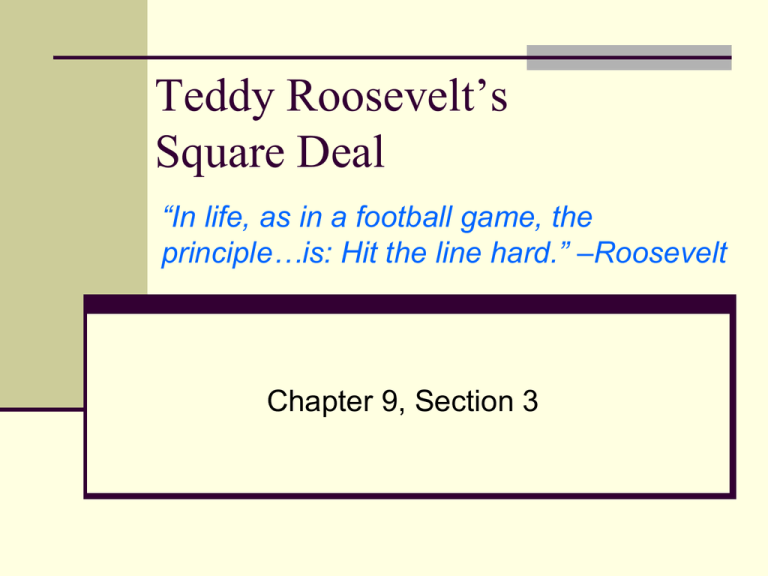
Teddy Roosevelt’s Square Deal “In life, as in a football game, the principle…is: Hit the line hard.” –Roosevelt Chapter 9, Section 3 Theodore Roosevelt Teddy Roosevelt Became President when McKinley assassinated Helped create the modern presidency with his bold and aggressive programs. Square Deal – progressive reforms sponsored by Roosevelt Trust Busting 4/5 of Industry were controlled by trusts in 1900. Ordered the Justice Department to file 44 anti- trust suits under the Sherman Antitrust Act. Was successful in breaking up some trusts. Pg 319 Coal Strike of 1902 140,000 coal miners in PN went on strike, demanding 20% raise and 9 hour workday. Roosevelt threatened to take over the mines when coal reserves ran low. A compromise was reached. Precedent: government was expected to intervene when a strike threatened public welfare. Railroad Regulation Roosevelt wanted federal regulation. Elkins Act, 1903 Made it illegal for railroads to give rebates for using particular railroads. Illegal to change set rates without notifying public. Hepburn Act, 1906 Limited the distribution of free railroad passes ICC could set max. railroad rates. Regulating Foods and Drugs The Jungle by Upton Sinclair Exposed the horrors of the meatpacking industry. Roosevelt appointed a commission that echoed Sinclair’s claims. Meat Inspection Act, 1906 Dictated cleanliness requirements for meatpackers Program for federal meat inspecting Regulating Foods and Drugs Manufacturers claimed products were miracle cures. Pure Food and Drug Act, 1906 Halted sale of contaminated foods and medicines Truth in labeling policy Conservation and Natural Resources Natural Resources were being used irresponsibly and pollution was rampant. Set aside areas for government study 50 wildlife sanctuaries 7 national parks National Reclamation Act, 1902 Money from selling public land funded irrigation projects. Civil Rights Roosevelt did very little to support civil rights for African Americans. Progressivism Under Taft Chapter 9, Section 4 William Taft Taft becomes President Taft and the Republicans easily win in 1908. Taft does not use presidency as “bully pulpit” like Roosevelt. Taft Stumbles Tariffs and Conservation The Payne-Aldrich Tariff Taft campaigned to lower tariffs House – Payne Bill – lowering tariffs Senate – Aldrich Bill – increased tariffs Taft signed Payne-Aldrich Tariff Compromise moderated high rates. Progressives in the party felt betrayed. Disputing Public Lands Richard Ballinger, Secretary of the Interior Removed 1 million acres of land from the reserve list. Taft fires Gifford Pinochet (Head of US Forest Service) for speaking out against Ballinger. Republican Party Splits Progressives did not trust Taft. Blamed cost-of-living on the Payne-Aldrich Bill Didn’t believe Taft would support conservation Conservatives stuck with Taft Saw him as a moderate who would not make too many drastic changes. Bull Moose Party Roosevelt entered Presidential race under a Progressive Third Party called “Bull Moose Party” Direct election of senators Women’s Suffrage Workmen’s compensation Eight-hour workday Minimum wage for women Outlawing child labor Federal regulation of business Election of 1912 Woodrow Wilson (D) – “New Freedom” William Taft (R) – “Conservatism” Theodore Roosevelt (P) – “Progressivism” Eugene Debs (S) – “Socialism” Fighting in the Republican Party Taft – “Roosevelt dangerous egotist” Roosevelt – “Taft fathead with brain of a guinea pig.” Wilson’s New Freedom Chapter 9, Section 5 Woodrow Wilson Clayton Antitrust Act, 1914 Strengthened the Sherman Antitrust Act, 1890 Prohibited corporations from acquiring stock of another if it created a monopoly Monopoly – when there is only one business that offers a service (no competition) Labor Unions had the right to exist Strikes, picketing, boycotts became legal Federal Trade Commission (FTC) Federal Trade Commission Act, 1914 Set up the FTC Watchdog agency Power to investigate violations Required reports from corporations New Tax System Underwood Tariff, 1913 Reduced tariff rates 16th Amendment Federal Income Tax to replace income from reduced tariffs Federal Reserve Act, 1913 Set up Federal Reserve System Regional central banks in 12 districts of the country. Pg 334 Women’s Suffrage Women win the right to vote after years of campaigning across the country. 19th Amendment Nationalizes Women’s right to vote. Wilson on Civil Rights Retreats from Civil Rights Puts White Southerners in his cabinet Re-segregates federal buildings in Washington, DC Pg 336


